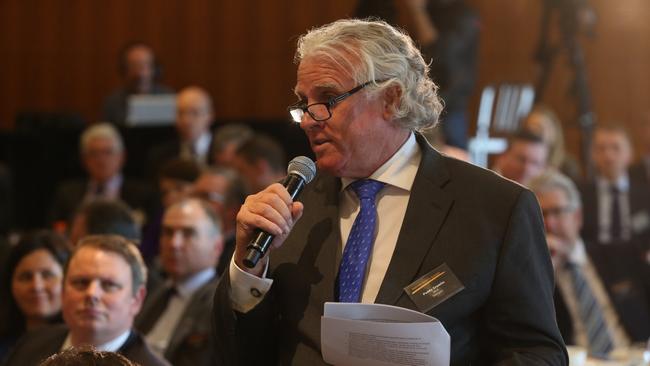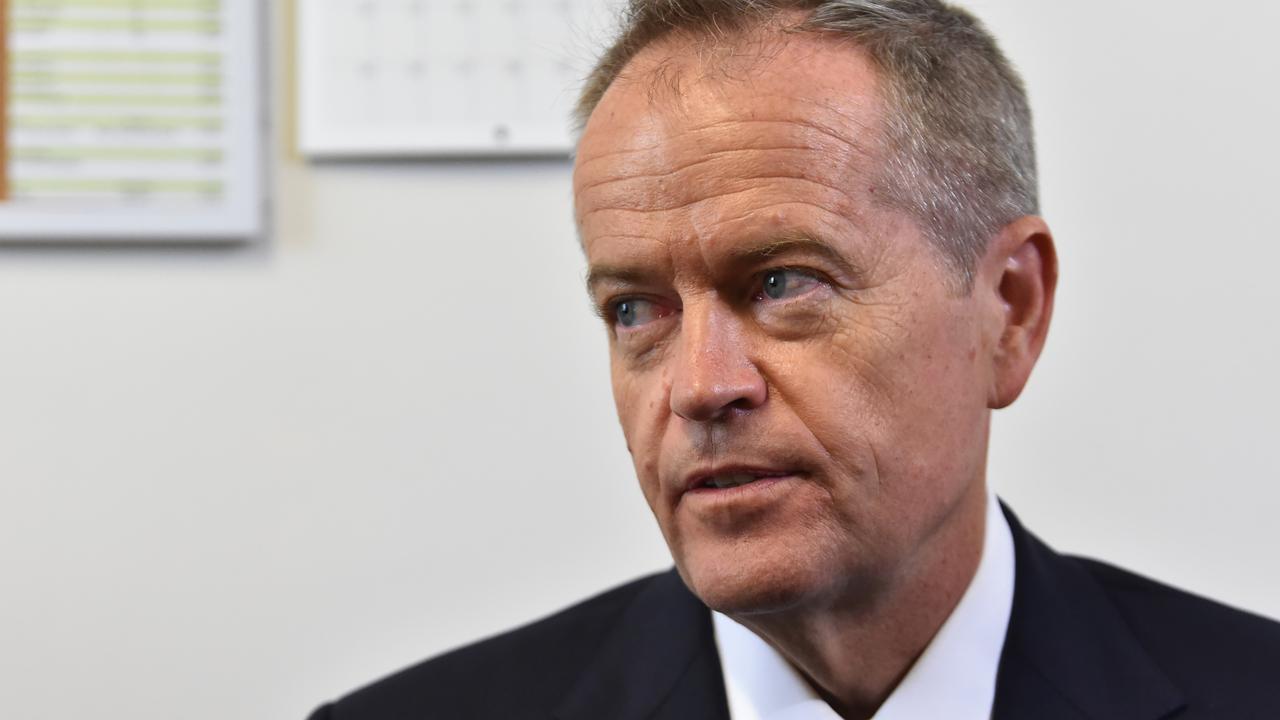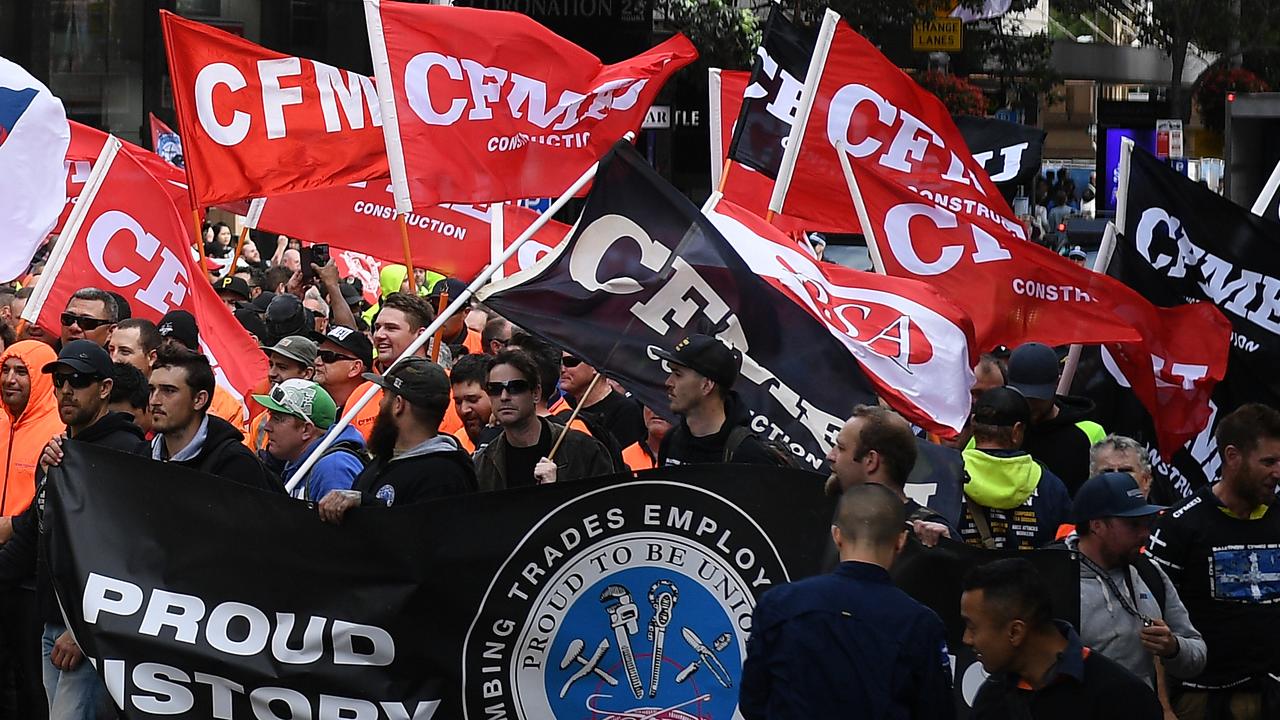MUA and CFMEU join forces in militant power play
The nation’s most militant unions have struck a far-reaching deal to wield more economic and political power.

The nation’s most militant unions have struck a far-reaching deal to wield more economic and political power, in an alliance that will challenge Malcolm Turnbull’s agenda while reshaping the way influence is traded within the Labor Party.
Heightening fears of their aggressive tactics, the unions revealed their ambition to create a united force with more than 100,000 members and the ability to exercise industrial muscle across workplaces from forestry to the waterfront. Employment Minister Michaelia Cash warned last night that the amalgamation of the Maritime Union of Australia and the Construction Forestry Mining and Energy Union should send “shivers down the spine” of all Australians because of their aggressive tactics.
The government appears powerless to stop the merger as it attempts to hold the CFMEU and other unions to account for the “lawlessness” on building sites alleged at the royal commission into trade union corruption.
Weeks after the Prime Minister declared he would not “wage war with unions” on workplace reform, the MUA and CFMEU will use their increased power to fight the government’s agenda, including the long-held ambition to restore a more powerful regulator on building sites.
While Mr Turnbull is yet to outline a reform agenda, he has aired ambitions to make workplaces more “flexible” and to lift productivity, but he appears set to confront an enlarged and emboldened union that could fight his policies all the way to the next election, due next year.
The CFMEU has been one of the hardest campaigners against the government’s trade deal with China and will be able to draw on the MUA’s substantial financial resources to escalate that campaign, turning the next election into a test of union power.
Labor insiders said the amalgamation would present a challenge to Bill Shorten as well, by forming a united bloc within the party to influence policy, build the numbers for individual candidates at preselections and help — or hinder — the leader.
CFMEU national secretary Michael O’Connor was a key player in Labor’s national conference in July, where he helped the Opposition Leader prevail on same-sex marriage, boat turn-backs and other hard-fought debates. Mr O’Connor said yesterday the “merger of equals” between the CFMEU and MUA would strengthen their hand in areas beyond wages and conditions. “The struggle isn’t just about increasing wages or creating a safe work site. There is also a bigger and important political struggle,” he declared.
MUA national secretary Paddy Crumlin said the result would be Australia’s most powerful union and a “monumental opportunity” to represent working men and women.
The idea of deregistering the CFMEU has come up in debate around the royal commission into trade union corruption, where contractors have alleged “thuggery” by the union, and one official, John Lomax, has been charged with blackmail for putting pressure on an employer. Industrial relations experts saw the sudden move to amalgamate as an attempt to prepare for government sanctions against the union after commissioner Dyson Heydon hands down his final report at the end of the year.
Putting CFMEU assets into a new entity could fend off any government attempt to deregister the union, given the MUA is not facing the same findings in the royal commission report.
Political campaigner Ian Hanke, an adviser to former workplace minister Peter Reith during the waterfront dispute of the 1990s, said the combined power of the two unions could lead to a blockade in the construction industry extending to a go-slow at the ports.
“The fact they could operate jointly across Australia could cripple the nation,” Mr Hanke said. “Anybody with an interest in improving the Australian economy would have to be very concerned about this.”
The merger would need the approval of the Fair Work Commission, but there does not appear to be any way for the government to veto the change.
The two unions outlined the amalgamation yesterday after Mr Crumlin and the MUA national council met CFMEU leaders including Dave Noonan, Tony Maher and Mr O’Connor.
A union source not related to the CFMEU or MUA said the combined entity would be “very powerful” in areas such as the resources industry, where the maritime union has been blamed for holding up major gas projects. “They will be painful and annoying for commerce,” the source said.
A Labor figure said: “This is about industrial influence. And mad militancy aimed at more pressure on the ACTU and the Labor Party.”
While the move’s significance would not be felt immediately, the unions would come to dominate Labor preselections, he added. “The CFMEU thinks it is under siege and has had to pay substantial damages to Boral and Grocon and is incurring ongoing fines and is under investigation by the ACCC. It will benefit from merging with the asset-rich MUA.”
Master Builders Australia chief executive Wilhelm Harnisch described the merger as “bad news” for the construction industry because the unions had “scant regard for the impact of their unlawful behaviours”.
Former employment minister Eric Abetz said the combined union would be a “force of nature” within the Labor Party that would be difficult to oppose.





